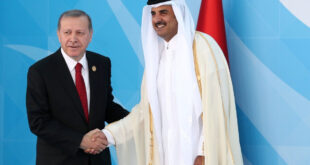One of Bulgaria’s right-wing nationalist parties, VMRO, said that it would ask Parliament to debate whether the country should hold a referendum on Turkey’s accession to the European Union, after the party claimed to have gathered 300 000 signatures from Bulgarian citizens calling for a referendum.
The party is invoking a Bulgarian law on direct democracy, and has been holding meetings with parties represented in Parliament to argue for a referendum.
It said that the collection of signatures, gathered from all over Bulgaria in recent months, would be presented on July 14 2010 to parliamentary officials by a procession of young people.
A day earlier, Foreign Ministry spokesperson Vessela Tcherneva, answering questions at a regular media briefing, said that Bulgaria supported Turkey’s accession process provided that all membership criteria were met.
This position was an expression of Bulgaria’s strategic interests, both domestic and in a wider European context, Tcherneva said. It had been the consistent policy of all Bulgarian governments so far, she said.
Foreign Minister Nikolai Mladenov had said repeatedly that it depended on Ankara to implement the reforms necessary to make progress on issues of human rights and democracy and to comply with EU criteria.
Mladenov had said that Bulgaria was not lobbying for Turkey, as it had not lobbied for any country, because each had to be assessed according to the progress it achieved, Tcherneva said.
On July 13, EU foreign policy chief Catherine Ashton assured Turkey that its troubled bid to join the European bloc is on track, the Voice of America reported.
Ashton was speaking in Istanbul alongside Turkish foreign minister Ahmet Davutoglu and other Turkish officials.
Ashton welcomed Turkey’s growing influence in the Middle East, the Balkans, Iran, Afghanistan and Pakistan, while EU Enlargement Commissioner Stefan Fuele called for ways to speed up ongoing accession talks.
EU officials opened those talks with the Ankara government in 2005. But the process has slowed to a crawl in the past two years, as France and Germany raised objections to mainly-Muslim Turkey’s membership.
In June 2010, US defence secretary Robert Gates warned that Europe’s reluctance to bolster ties with Turkey was pushing the Ankara government away from the West, VOA said.
Gates blamed Turkey’s perceived shift eastward on Europe’s refusal to grant Ankara the “organic link to the West” that Turkish officials are seeking.
Eight EU chapters or categories in the lengthy EU accession process remain frozen, in an EU attempt to spur the Ankara government to open its airports and seaports to Cyprus.
Turkey does not recognise the Greek Cypriot government, and has sided with the Turkish Cypriot north in the 36-year standoff that has divided the Mediterranean island-nation.
Ongoing reconciliation talks begun in 2008 between the Turkish north and Greek Cypriot south have so far failed to produce a settlement.
 Eurasia Press & News
Eurasia Press & News



